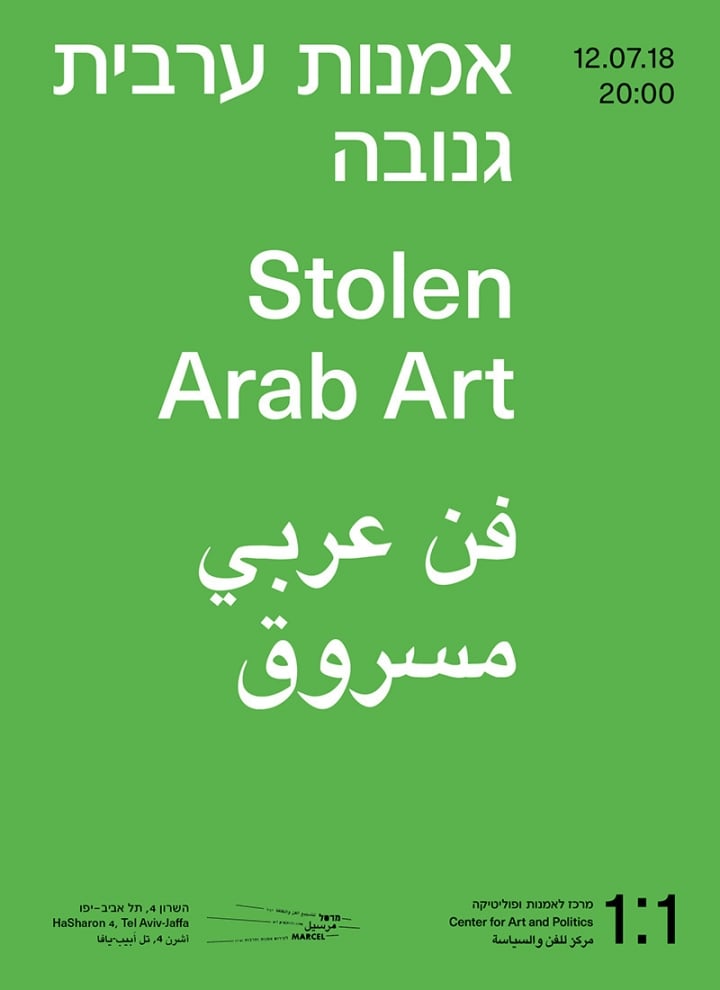
Tensions between Israel and the Arab world have come to the fore at the 1:1 Center for Art and Politics in Tel Aviv, which opened its doors last week with the inaugural exhibition “Stolen Arab Art.” True to its name, the show quite literally presents the work of Arab artists without the creators’ permission or consent. Adding to the controversy, video artworks—by Wael Shawky, Walid Raad, and two other yet-to-be-identified Arab artists—are uncredited.
Many have been quick to criticize the provocative action. In an editorial condemning the exhibition, Tohu Magazine slammed the show’s organizers for their “blatant disregard for the rights of artists and citizens, under the guise of enlightenment and dialogue.”
Organizers “are acutely aware of this act of expropriation,” according to the exhibition’s description. They claim the show is being held in defiance of—and in hopes of breaking—the Palestinian Campaign for the Academic and Cultural Boycott of Israel, a subsection of the Boycott, Divestment, and Sanctions movement against the Jewish state. “We wish to promote a shared reality marked by open dialogue and exchange throughout the Middle East, without wars, occupation, or any borders,” the description says.
Wael Shawky, Cabaret Crusades: The Path to Cairo (2012), video still. Part of the work is being shown in “Stolen Arab Art” at Tel Aviv’s 1:1 Center for Art and Politics without crediting the artist, or obtaining his consent. Courtesy the artist and Sfeir-Semler Gallery, Beirut/Hamburg.
At the opening on July 12, there wasn’t so much an open dialogue as an argument, with videos posted to social media capturing a confrontation between Palestinian artist Raida Adun and Adi Englman, director of Hasharon 4 complex that houses 1:1. “This is beyond shameless,” Adun said. “It is a total lack of respect to artists who have never given their consent to this. You are endangering those artists’ lives and careers.”
The artists’ names are not included, the statement notes, “on the assumption that they would not want for their work to be shown in Israel, as part of the Arab and International Cultural Boycott of Israel, and with the aim of not foisting an undesired cooperation upon them, so as to shield them from criticism and accusations of treason in their countries of origin.”
The unidentified works reportedly include excerpts from Walid Raad’s The Atlas Group project (1989–2004) and Wael Shawky’s Cabaret Crusades (2010–15).
The show is curated by Omer Krieger, formerly artistic director of Jerusalem’s Under the Mountain art festival. He had previously been in talks with an artist in Gaza about the center’s opening exhibition, but out of fear of reprisals, the artist backed out.
Visitors “Stolen Arab Art” exhibition at the 1:1 Center for Art and Politics in Tel Aviv. Photo by Moti Milrod, courtesy of Omer Krieger and the 1:1 Center for Art and Politics.
Krieger was careful, he told Haaretz, to characterize the show as “an Israeli act of aggression” in order to protect the artists. “This exhibition is an art project, a type of performance,” he explained.
But he won’t necessarily agree to remove the artists’ work from the show, should they ask. “We’ll have to negotiate. This is a hostage-taking situation,” he told Hyperallergic. “I hope that the artists will appreciate the sophistication of this action, that they will understand its purpose and create contact with us.”
So far, that seems unlikely. Raad has declined to comment on the matter, but Shawky has made his disapproval known. “What is the point of being a thief and so proud of your act!” he told Middle East Eye. “This will never change anything—all these artists, including myself, are against showing in Israel.”
“Stolen Arab Art” is on view at the 1:1 Center for Art and Politics, HaSharon 4 Tel-Aviv-Jaffa, Israel.